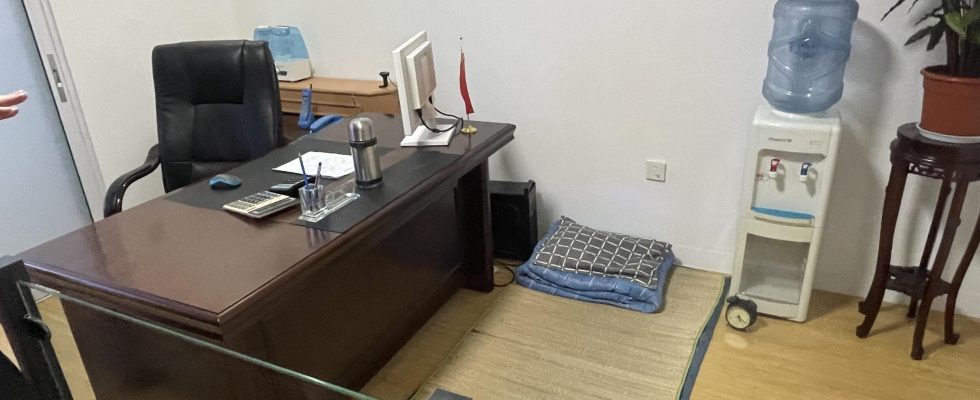The first television series by Hong Kong director Wong Kar-wai is a hit on Chinese television. Blossoms Shanghai tells the story of Shanghai in the 1990s over around thirty episodes. A soap opera that awakens Chinese nostalgia for openness and double-digit growth.
5 mins
From our correspondent in Beijing,
Nostalgia isn’t quite what it used to be, but Wong Kar-wai’s return to the screen has a very special flavor for Shanghainese people. The Chinese economic capital is in fact one of the central characters of Jin Yucheng’s novel: Blossoms Shanghai (“Fan Hua” in Mandarin), published in 2012 and now adapted for television. We know the meticulousness of the Hong Kong director for each of his shots. It took six years to tell the story of Abao, a young man who started from nothing and became a successful entrepreneur.
Chinese dream
The 1990s and the two preceding decades are seen, with hindsight, as the age of possibilities in China. A time when, after opening up to red capitalism, the Chinese economy took off. “ For a while now, we have been witnessing the emergence of series and films that return to this period.explains Aladin Farré, audiovisual producer based in Beijing and author of a cinema post on the Bilibili platform. I am thinking in particular of Eighth suspect by Jonathan Li. It’s a detective film based in Canton, which also evokes the 90s. We are therefore in the presence of films which retrace this period during which China opened up to the world and the economy began to rise. There is not necessarily a direct link with the theme of growth, but the stories take place in this context and it works very well for the Chinese audience. »
Shanghai in the 90s in the Chinese series 🎦 directed and produced by Wong Kar-wai. Blossoms Shanghai
was released on CCTV8 the day after Christmas. In the key roles Hu Ge, Ma Yili, Tiffany Tang and Xin Zhilei. 🧵 pic.twitter.com/OKWfOwrs8O— Stéphane Lagarde (@StephaneLagarde) December 29, 2023
A boom in the Chinese economy which contrasts with the slowdown of the second largest economy in the world today. During the years of Covid restrictions and border closures and now with faltering growth, nostalgia regularly comes to the fore. The 80s filled the theaters Nihao, Li Huanyingby Jia Ling, three years ago. This time, it’s Shanghai in the 90s.
Is the “Chinese dream” promoted by President Xi Jinping already a thing of the past? “ People are starting to realize that the equivalent of the thirty glorious years is ending in China, underlines Aladin Farré. Talking about a time when everything was possible and where you just needed to be motivated and have a little capital to succeed, partly explains the success of the series. Afterwards, we must also remember that Wong Kar-wai is a great director and that the series is very well done. It’s not just because we set the scene in the 90s that it works. It’s a little more complex than that! »
Shanghai dialect
In August 2020, the small ad placed by the production in a newspaper indicating that the film crew was looking for everyday objects from the period 1975-1995, triggered an avalanche of responses. Vintage newspapers, lighters, sewing machines and even a car were submitted by readers. And this nostalgia for the beginnings, this vintage spirit is now cultivated in advertisements and even in businesses.
This is particularly the case at the headquarters of JD.com, one of the Chinese retail giants in the suburbs of Beijing. The campus brings together more than 30,000 employees. In addition to the presentation of the infrastructures and videos on the operation of the robotic sorting and delivery platforms, the press or personalities are also entitled to the discovery of a small room in which the office of the founding boss, Richard Liu, has been recreated. The small office was located at the time in the electronics district in the northeast of the capital where the electronics stores were located. It was just after the SARS outbreak, the company had just moved to online sales.
In the mini vintage museum, a corded telephone, an old PC and on the floor a mat and a large alarm clock. “ Our boss often slept in his office at the time, explains the visit attendant. For the anecdote, you see that here, he had placed his alarm clock on the floor. It rang every two hours, so it could respond quickly to online customers. »
An office in its original state, old photos from the period, this same vintage craze applies to the series by the director ofIn the Mood For Love. The filming locations in central Shanghai have become a selfie magnet. Some restaurateurs are playing the menu of dishes from the film which are sold out on delivery sites. The same goes for the actors’ clothes, which have become trendy again among tailors. On the Xiaohongshu network, netizens share tips on how to dress like the characters in the series. “Many ready-made clothes are not stylish enough. Just like in Blossoms Shanghai, your costume must be personalized and tailor-made,” write some Internet users cited by the Jing Daily.
This revival of the 90s also allows Wong Kar-wai to revive the Shanghai dialect crushed by decades of promotion of Mandarin. “ Chinese superstars Hu Ge and Ma Yili are in the cast, but it’s the local Shanghainese language, spoken by their characters, that steals the show “, notes AFP. As the dialect is no longer used in everyday use, enthusiasts have gone so far as to create tutorials on the nature of expressions and vocabulary points. A nostalgia through the ear, probably the most sentimental, which largely contributes to the success of the series, amplified by the notoriety of Hu Ge, Ma Yili, Tiffany Tang and Xin Zhilei in the main roles.
Also listenAll the cinemas in the world – Rosine Mbakam, director of the film “Mambar Pierrette”
